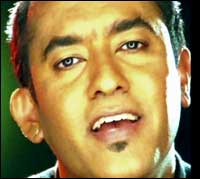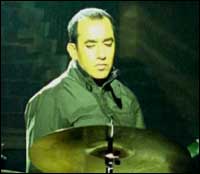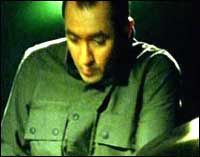 About three months ago, The New York Times carried a more than full-page article headlined 'Home Is Where The Studio Is'. It was about how even big-time music names like Moby were increasingly recording albums at home to free the creative process from the economics of expensive studio time. And a cursory browse through the Internet will tell you the Web is letting musicians in the West expand their horizons, free from the record company leash.
About three months ago, The New York Times carried a more than full-page article headlined 'Home Is Where The Studio Is'. It was about how even big-time music names like Moby were increasingly recording albums at home to free the creative process from the economics of expensive studio time. And a cursory browse through the Internet will tell you the Web is letting musicians in the West expand their horizons, free from the record company leash.
What most people don't know is that the technological revolution has arrived on the Indian music scene too.
Sanjay Maroo, whose second video from his newest album Chaley Jaaon, Kya karti ho, is getting wide airplay on music channels, does. A businessman by day, he is a musician at home, and when he is performing live.
"MIDI (musical instruments digital interface) has revolutionised music," Maroo, whose album is being promoted exclusively on the Internet by rediff.com, says.
And, thanks to that, he recorded the album for "over two years".
In a freewheeling conversation -- ranging from the Roland V-drum and Cubase SX to the music business in general -- Maroo says the Web will free musicians from the shackles of record company whims.
 As we sit down for a bite by the picturesque Brabourne Stadium ground, the obvious question about remixes pops out. Chaley Jaoon kicks off Banta nahi remix, a song that slams the 'hit factory' that steals other people's material. Banta nahi remix was also the first video from his album to hit airwaves.
As we sit down for a bite by the picturesque Brabourne Stadium ground, the obvious question about remixes pops out. Chaley Jaoon kicks off Banta nahi remix, a song that slams the 'hit factory' that steals other people's material. Banta nahi remix was also the first video from his album to hit airwaves.
"I am against remixes because of two reasons," Maroo says, as he outlines them with the authority of a man who knows what he is talking about.
Maroo's first problem with remixes is that the original composers of the tunes hardly get any credit. "They perhaps get five percent of the MRP of a song. That is peanuts, man. I am part of an organisation that protects musicians' intellectual property rights. The organisation led a delegation to the prime minister and the President urging that copyright laws be changed."
Second, he says, "Not all songs lend themselves to remixes. If it the remix of a current song on air, I have no problems with it. Take the title track of Dus, for instance." But, if it is the remix of an old hit, "Have you asked the composer for his permission," Maroo asks.
"We are the poets of this generation. What is our contribution to the world? Don't we have anything original to say?" The songs of Chaley Jaon are deliberately off the beaten lyric-writing track, he points out.
Are record companies to blame for original material not seeing the light of day?
"Yes, but I would blame the audience also. They are the ones buying the records."
Why didn't he take the usual album promotion route? "I have done that, man. I always wanted to do something different. And I've got some great feedback on it. Many people have congratulated me on it."
Maroo is convinced the Internet is the future of music. He says there are many talented musicians out there who could use the Web to beat the blinkered thinking of record company executives.
 "How many big record companies are there in India," he asks, "four, five? So, if four or five people [who decide which artist to sign up] don't like your music, does that mean it is worthless?"
"How many big record companies are there in India," he asks, "four, five? So, if four or five people [who decide which artist to sign up] don't like your music, does that mean it is worthless?"
So, when does he think will the Internet really threaten the brick and mortar record company-store shelf model? "It's already happening, brother," Maroo, who listens to a wide variety of music, from Bob Dylan to Trilok Gurtu, says. "Look at download figures and record sales. Downloads have overtaken sales in terms of growth."
In the West, 'Indie' labels have given artists the freedom big record companies do not allow. Can the Web do that for musicians in India? "How beautifully you put it," Maroo agrees in his warm-hearted style.
He goes on to add that live shows are what bring home the moolah. "Not even one percent of the artists make money from records."
Why is he called 'the original fanatic'? "Whenever I spot someone faking it [lip synching to pre-recorded music] I go up to them and tell them, 'You can fool some people some time, but you can't fool all the people all the time.'"
What's his message to the many talented musicians of the country struggling for a break? "Just do your thing. And believe in it."
"I have tremendous faith in the youth of this country, he adds. "Despite tremendous infrastructure problems, they will put India prominently on the world map in every sphere."
Chat with Sanjay Maroo! Join us on Friday, November 25, at 4 pm.
DON'T MISS!
India's first legal music downloads?
Sanjay Maroo on rediff.com






 © 2025
© 2025